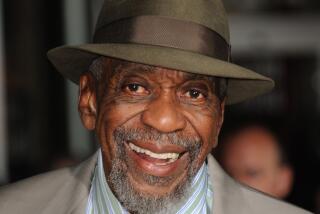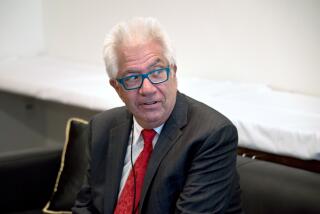O.E. Clubb; Ex-State Dept. China Expert
NEW YORK — O. Edmund Clubb, the State Department’s foremost China expert before he became entangled in the loyalty-security net of the early 1950s and resigned, has died.
The career Foreign Service officer was cleared of McCarthy-era charges of disloyalty but resigned after being reassigned to an obscure job.
Clubb, 88, died of Parkinson’s disease Tuesday at Columbia-Presbyterian Medical Center.
He served more than two decades in the Foreign Service and was the last U.S. diplomat stationed in Beijing after the Communist takeover in 1949.
After that, he returned to Washington and was named chief of the China desk at the State Department but was suspended a year later as a security risk.
Clubb was condemned by a loyalty board but was cleared on appeal by Secretary of State Dean Acheson. He was then assigned to a minor State Department job and resigned after it became evident his career was ruined.
His difficulty stemmed from a report he issued 30 years earlier. In 1932, he reported from China that the Communists were popular in the regions they controlled and that the U.S.-supported Chinese Nationalists were corrupt but that they might force the Communists to flee to the west.
His prediction foreshadowed the Long March and was later to be cited by his critics as evidence of his pro-communist leanings.
Adding to his dilemma was a visit he made later on home leave. He had gone to visit the offices of the Communist magazine, New Masses, in New York City where he brought a letter of introduction from Agnes Smedley, a leftist journalist in China. There he encountered Whittaker Chambers, then a Communist but by the Red-scare era of the 1950s a fervent anti-communist and key congressional witness.
Chambers was to infer later that Clubb’s visit made him a communist sympathizer.
Clubb was born in South Park, Minn., and enlisted in the Army at 17.
In 1928, he qualified for the Foreign Service and was sent the next year to Beijing.
Later in Indochina, Clubb was captured by occupying Japanese forces two days before Pearl Harbor and was held for two months in solitary confinement and six months more with other internees, then exchanged for Japanese held by the Allies.
He spent most of the rest of the war and the immediate postwar period in the Soviet Far East, Manchuria and China.
More to Read
Sign up for Essential California
The most important California stories and recommendations in your inbox every morning.
You may occasionally receive promotional content from the Los Angeles Times.










